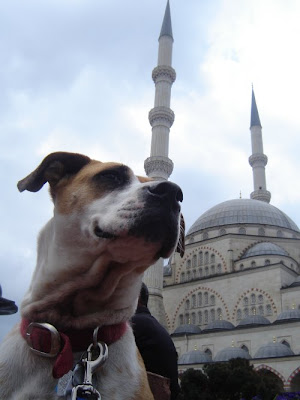Writing about the character of a place is akin to doing the same for music; you can't get the sound from a story in a magaziiiiiiineeeeee -or the adrenaline rush of Tantric Turkish Traffic. With that in mind, let's turn our eye to that egalitarian conduit of danger and desire, the street.
Consider what's wrong with this picture. There will be a quiz, so look close:

Ready? Let's begin: this is a one way street (streets are only one-way in Turkey so long as no one decides to drive the other way), attempting to flow towards us; the only legal parking on this section is on the far right, pointing to the curb; the car pointing towards us on the right is double parked. BOTH rows of cars on the left -including the one with it's lights on- are parked in a bus stop and traffic, respectively. While police are everywhere, determining which infraction of law to attend to is a challenge; by the time a removal vehicle manages to navigate traffic, the problem may very well have moved elsewhere. If by some miracle a removal truck arrives before the problem departs, it will extend a crane-arm, lower straps, and pluck the offender into the sky.
While the pains of a transportation infrastructure tasked with meeting the needs of over 15 million people isn't unique to The City, the reaction to it by these people are. Rush hour traffic -an hour that extends from sun rise to well beyond set with only brief periods of respite- obeys no Euclidean rules of geometry. They highway is a messy organic flood of people shouting, "ME FIRST!"; insignificant little lines on the pavement are disregarded as automobiles are piloted -with one foot on the gas and one on the break- into any available space. The wager is that the other guys sense of self preservation will be stronger than an impulse to exercise traffic-justice with several tons of steel. These little victories of inches result in miles of gridlock. Add the occasional horse drawn wagon to 8 lanes of traffic and being a pedestrian becomes a practical consideration.
With a median Turkish income of 600 New Turkish Lira (around 507 US Dollars), and the cost of petrel the highest in the world (thanks to usage taxes, cost-per-gallon come to $9.92 US or 11.74 YTL - 2% of the median income), it is no surprise that the vast majority of Turks depend on public transportation.
From small to big, more variety exist than I care to list: the standard Yellow Cab, the Domush -a mini-van that departs when it resembles it's name -stuffed!- the Minibus (a Cargo van for people), the bus, the accordionated extra-long bus, and the double decker. By sea -in the city, it is THE major highway- there are a vanguard of vapur, ranging from small boats that hold less than 100 to triple-decker arks, and -for those that can afford it- super-fast catamarans.
The cement to this chaos amalgama are pedestrians and scooter pilots. Pedestrians will occupy any vacant, or soon to be vacant -or imagined to be vacant space- that they can manage, and deport themselves as though having the mass and status of an armored personel carrier. In a wonderful display of evidence in support of the Thoreauien Over-Soul, swarms of pedestrians will -without detectable communication- calculate the exact number of bodies required to concern a speeding automobile, and, if judged sufficient, step into traffic en-mass. Scooters are the commercial dream vehicle of grown-adolescence, and move without discrimination across all non-fluid surfaces with the reckless determination of a video game player questing for a power-up. These mosquitoes of mechanised transportation may be seen cuting through crowdes on the side walk, jumping curbs onto the street, and running counter to auto traffic, often carrying loads of cooling take-out for delivery. It is not unusual to see a scooter loaded with as many as six 19 liter water bottles -weighing a heafty 317 pounds if full!











































